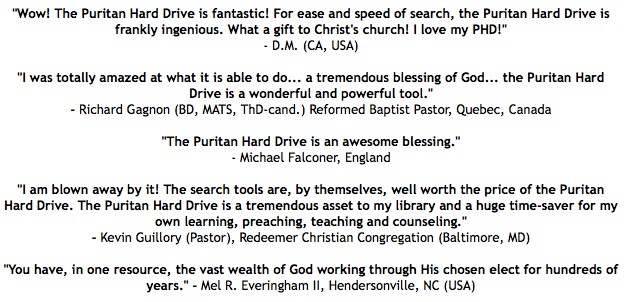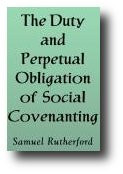 Loading... Please wait...
Loading... Please wait...- SWRB Home
-
Free Resources
- Short Listings Of Free Reformation & Creation Resources
- Free Reformed, Puritan, Covenanter and Creationist Videos
- Thousands of Links to Free Audio, Video and Printed Resources
- Free Puritan Books, Reformed MP3s, and Calvinist Videos
- Puritan Quotes, Free Reformation MP3s, Reformed Books and Calvinist Videos From PuritanDownloads.com On FaceBook
- Shipping & Returns
- Blog
- Privacy Policy
- Contact Us
- Payment Options
- Help
-
About Us
- Sitemap
Pastor Scott Brown, on the left in the video above, is the Director of the National Center for Family-Integrated Churches (NCFIC)
Resource Categories
- PURITAN HARD DRIVE REVIEWS
- PASTOR ROB VENTURA ON THE PURITAN HARD DRIVE
- DR. VODDIE BAUCHAM, JR. ON THE PURITAN HARD DRIVE
- R. C. SPROUL ON SWRB
- DR. JOEL R. BEEKE ON THE PURITAN HARD DRIVE
- PASTOR GREG L. PRICE ON THE PURITAN HARD DRIVE
- DR. MATTHEW MCMAHON ON THE PURITAN HARD DRIVE
- PASTOR SCOTT BROWN ON THE PURITAN HARD DRIVE
- PASTOR W. J. MENCAROW ON THE PURITAN HARD DRIVE
- JOAQUIN FERNANDEZ ON THE PURITAN HARD DRIVE
- PASTOR DAVID SILVERSIDES ON THE PURITAN HARD DRIVE
- JOHN HENDRYX ON THE PURITAN HARD DRIVE
- PASTOR KEVIN GUILLORY ON THE PURITAN HARD DRIVE
- RICHARD BENNETT ON THE PURITAN HARD DRIVE
- DR. KENNY RHODES ON THE PURITAN HARD DRIVE
- JUSTIN RAWSON ON THE PURITAN HARD DRIVE
- PASTOR JAMES WALLACE ON THE PURITAN HARD DRIVE
- PASTOR RICHARD GAGNON ON THE PURITAN HARD DRIVE
- PASTOR JOE HAYNES ON THE PURITAN HARD DRIVE
- DR. STEVEN DILDAY ON THE PURITAN HARD DRIVE
- PASTOR ANDREW COMPTON ON THE PURITAN HARD DRIVE
- TERENCE ELLARD ON THE PURITAN HARD DRIVE
- PASTOR JERRY JOHNSON ON THE PURITAN HARD DRIVE
- PASTOR DAVID PETRIE ON THE PURITAN HARD DRIVE
- JIM DODSON ON THE PURITAN HARD DRIVE
- PASTOR BRIAN SCHWERTLEY ON THE PURITAN HARD DRIVE
- PASTOR PHIL GIBSON ON THE PURITAN HARD DRIVE
- MEL R. EVERINGHAM II ON THE PURITAN HARD DRIVE
- PAUL BLYTH ON THE PURITAN HARD DRIVE
- STEVE KETTLER ON THE PURITAN HARD DRIVE
- D. M. (CALIFORNIA) ON THE PURITAN HARD DRIVE
- MICHAEL CAUGHRAN ON THE PURITAN HARD DRIVE
- WIILIAM NOPPER IV ON THE PURITAN HARD DRIVE
- LINDA THERIAULT ON THE PURITAN HARD DRIVE
- WILLIAM WARNOCK ON THE PURITAN HARD DRIVE
- ROBERT KOH ON THE PURITAN HARD DRIVE
- WHAT'S ON THE PURITAN HARD DRIVE?
- ALL PURITAN HARD DRIVE VIDEOS
- PHD-ODE INSTALLATION VIDEOS
- COMMENTS ON SWRB
- ALL PURITAN QUOTE VIDEOS
- PURITAN HARD DRIVE SCREENSHOTS
- PURITAN HARD DRIVE MINISTRY AND DONATION OFFERS
- TABLE OF RESOURCE CATEGORIES
- Advanced Studies
- SWRB SERMONAUDIO MOBILE APP
- Apologetics
- Assurance
- Attributes and Holiness of God
- Augustine
- Banner of Truth
- Baptism
- Beginners
- Bibles (Geneva, KJV, Hexapla, etc.)
- Biblical Counseling
- BIBLICAL HD COLLECTION
- Biblical Interpretation (Hermeneutics)
- Biographies and Autobiographies
- Calvinism and the Sovereignty of God
- CALVINISM HD COLLECTION
- CALVINIST CLASSICS HD COLLECTION
- Charles Spurgeon
- Children's Books
- CHRISTIAN EDUCATION HD COLLECTION
- Christian History
- Church Government
- Civil Government and Resistance
- CLASSIC CHRISTIAN HD COLLECTION
- Classic Puritan and Reformed Sets
- Commentaries
- Contemporary Issues
- Covenant Theology and Covenanting
- COVENANTER HD COLLECTION
- Covenanters and Covenanted Reformation
- Creation and Creationism
- Creeds, Confessions and Covenants
- Cults, False Religions, Psychology, Humanism
- Dealing with Affliction, Suffering, and Sickness
- Debates
- Dutch Reformed
- Education and Home Schooling
- English Puritans, Covenanters and Reformers
- Family, Children, Home, and Family Worship
- First Reformation
- Five Points of Calvinism (TULIP)
- For Pastors and Elders
- For Seminary Students
- FREE PURITAN & REFORMATION MP3 AUDIO SERMONS/BOOKS
- FREE PURITAN BOOKS, REFORMATION MP3s, PDFs, VIDEOs
- George Gillespie
- God's Law, The Ten Commandments, etc.
- Greg L. Price on Headcoverings
- Heaven, Hell and the Final Judgment
- Holy Days (Lord's Day, Christmas, Easter, etc.)
- HOME SCHOOL HD COLLECTION
- Intermediate Studies
- John Bunyan
- John Calvin
- John Knox
- John Owen
- Jonathan Edwards
- Justification
- Languages, Dictionaries, Reference, etc.
- LOOK WHO LOVES THE PURITAN HARD DRIVE
- Lord's Supper (Communion)
- Marriage, Courtship, etc.
- Martin Luther and Lutheranism
- Martyrs and Persecution
- Other Protestant Works
- Predestination and Providence
- PRESBYTERIAN HD COLLECTION
- Presbyterians and Presbyterianism
- Prophecy, Antichrist, and Eschatology
- PROTESTANT HD COLLECTION
- PSALM SINGING MP3s (COMPLETE SET)
- Psalters, Psalm Singing and Music
- Puritan Facts
- PURITAN FAST SERMONS (1640-1653) - 34 VOLS SET
- Puritan Fast Sermons 1640-1653
- Puritans and Puritanism
- PURITAN HARD DRIVE
- REFORMATION HD COLLECTION
- Reformation History
- Reformed and Puritan Classics
- Reformed Baptist
- REFORMED BAPTIST HD COLLECTION
- REFORMED HD COLLECTION
- REFORMED PRESBYTERIAN HD COLLECTION
- Reformed Presbytery, RPNA Protesters, etc.
- Reformed Theology
- Reformed Worship, The Regulative Principle, etc.
- Roman Catholicism, the Jesuits, Islam, etc.
- Salvation and Evangelism
- Samuel Rutherford
- Sanctification, Prayer and Holiness
- Scottish Covenanters
- Scottish Presbyterianism
- Scripture Song MP3s (Psalms and Bibles Verses)
- Second Reformation
- Separation, Unity, Uniformity, etc.
- Sermons and Sermon Collections
- Solemn League and Covenant
- Theology and Doctrine
- Third Reformation
- Thomas Watson
- Westminster Confession, Assembly and Divines
- Authors (All A to Z)
Phone Orders:
(780) 450-3730
To obtain free Reformation books, Puritan MP3s and Calvinistic videos, SWRB discount coupons, etc., add yourself to SWRB's Puritan and Reformed email list by using the form above.
The Duty and Perpetual Obligation of Social Covenanting by Samuel Rutherford, et. al
Resource Details
Resource Description
The Duty and Perpetual Obligation of Social Covenanting by Greg Price, Samuel Rutherford, George Gillespie, John Brown of Wamphray, The Reformed Presbytery, the Church of Scotland (1639), the Westminster Assembly (1644), William Roberts, and David Scott.
"The material found in this bound photocopy addresses a forgotten and neglected ordinance of God: social covenanting. God's people in times of repentance and thanksgiving, trial and blessing have been a covenanting people. In the most pure times of ecclesiastical and civil reformation throughout history, both church and state under the mediatorial rule of Christ have by the grace of God bound themselves together by covenant to promote and defend the true Christian religion.
The first document adopted by the Westminster Assembly was in fact, the Solemn League and Covenant (1644). It united the kingdoms of Scotland, England, and Ireland in a covenanted reformation of both church and state in order to preserve, promote and defend the true Christian religion (as summarized in the Westminster Confession of Faith, Larger and Shorter Catechisms, Directory For Public Worship, and Form of Church Government), and in order to expose and uproot all false teaching contrary to the Scripture and these standards.
Furthermore, it was not only the desire of the Westminster Assembly to unite in covenant the three British kingdoms, but rather to include in this covenanted reformation all of the Reformed Churches throughout Europe. Consider the goal of the Assembly as summarized by Hetherington: 'There was one great, and even sublime idea, brought somewhat indefinitely before the Westminster Assembly, which has not yet been realized, the idea of a Protestant union throughout Christendom, not merely for the purpose of counterbalancing Popery, but in order to purify, strengthen, and unite all true Christian churches, so that with combined energy and zeal they might go forth, in glad compliance with the Redeemer's commands, teaching all nations, and preaching the everlasting gospel to every creature under heaven.
This truly magnificent, and also truly Christian idea, seems to have originated in the mind of that distinguished man, Alexander Henderson. It was suggested by him to the Scottish commissioners, and by them partially brought before the English Parliament, requesting them to direct the Assembly to write letters to the Protestant Churches in France, Holland, Switzerland, and other Reformed Churches. . . . and along with these letters were sent copies of the Solemn League and Covenant, a document which might itself form the basis of such a Protestant union.
The deep thinking divines of the Netherlands apprehended the idea, and in their answer, not only expressed their approbation of the Covenant, but also desired to join in it with the British kingdoms. Nor did they content themselves with the mere expression of approval and willingness to join.
A letter was soon afterwards sent to the Assembly from the Hague, written by Duraeus (the celebrated John Dury), offering to come to the Assembly, and containing a copy of a vow which he had prepared and tendered to the distinguished Oxenstiern, chancellor of Sweden, wherein he bound himself 'to prosecute a reconciliation between Protestants in point of religion'. . . . [O]n one occasion Henderson procured a passport to go to Holland, most probably for the purpose of prosecuting this grand idea.
But the intrigues of politicians, the delays caused by the conduct of the Independents, and the narrow-minded Erastianism of the English Parliament, all conspired to prevent the Assembly from entering farther into that truly glorious Christian enterprise. Days of trouble and darkness came; persecution wore out the great men of that remarkable period; pure and vital Christianity was stricken to the earth and trampled under foot. . .' (William Hetherington, History of the Westminster Assembly of Divines, [Edmonton, Alberta: Still Waters Revival Books], pp. 337-339).
The material presented herein is commended to the reader with the sincere prayer and confidence that God will again restore the Church of Jesus Christ to a glorious covenanted reformation -- one that will even surpass that one to which she had attained at the time of the Westminster Assembly.
However, when the Lord brings that future covenanted reformation it will not be limited to only three kingdoms of the earth, but by the grace and power of Christ our King, it will be a covenanted reformation that will encompass all of the nations of the earth (Ps. 2:6-12; Is. 2:1-4; Mt. 28:1-20) and will bring to the church a visible unity and uniformity that (unlike pleas for unity today) is firmly grounded upon the truth" (Greg Price, Preface).
The material contained in this compilation was gathered together by the session of the Puritan Reformed Church of Edmonton. Its 266 pages contain the following items, as listed in this bibliography for social covenanting:
- 1. Samuel Rutherford, Due Right of Presbyteries, pp. 130-139.
- 2. George Gillespie, The Works of George Gillespie, Vol. 2, pp. 71-88.
- 3. John Brown of Wamphray, An Apologetic Relation, pp. 167-175, 181-207.
- 4. David Scott, Distinctive Principles of the Reformed Presbyterian Church, pp. 14-90.
- 5. William Roberts, The Reformed Presbyterian Catechism, pp. 134-152.
- 6. The Reformed Presbytery, An Explanation and Defence of the Terms of Communion, pp. 181-187.
- 7. The Reformed Presbytery, Act, Declaration and Testimony for the Whole of the Covenanted Reformation, pp. 11-23.
- 8. The Reformed Presbytery, The Auchensaugh Renovation of the National and Solemn League and Covenant, pp. 115-140.
- 9. The Church of Scotland (1639), The National Covenant of Scotland, pp. 345-354 in the Westminster Confession of Faith published by Free Presbyterian Publications.
- 10. The Westminster Assembly (1644), The Solemn League and Covenant, pp. 355-360 in the Westminster Confession of Faith published by Free Presbyterian Publications.
- 11. The Church of Scotland (1648), A Solemn Acknowledgement of Publick Sins and Breaches of the Covenant, pp. 361-368 in the Westminster Confession of Faith published by Free Presbyterian Publications.
All resources for sale on this website, with the exception of Scottish Metrical Psalms MP3s, are available on the Puritan Hard Drive .
VIDEO INTRODUCTION TO THE PURITAN HARD DRIVE


Find Similar Resources by Category
Phone Orders:
(780) 450-3730
To obtain free Reformation books, Puritan MP3s and Calvinistic videos, SWRB discount coupons, etc., add yourself to SWRB's Puritan and Reformed email list by using the form above.








































